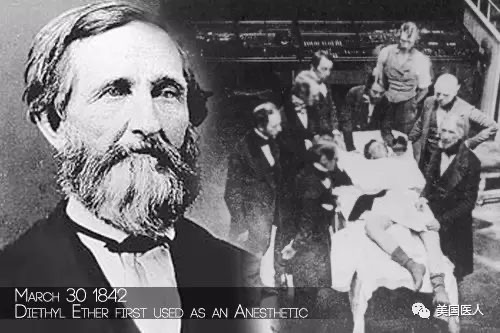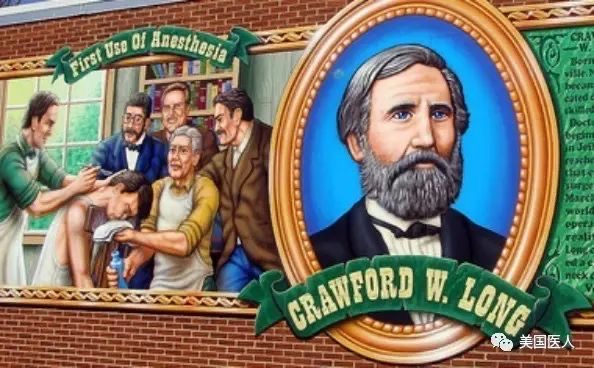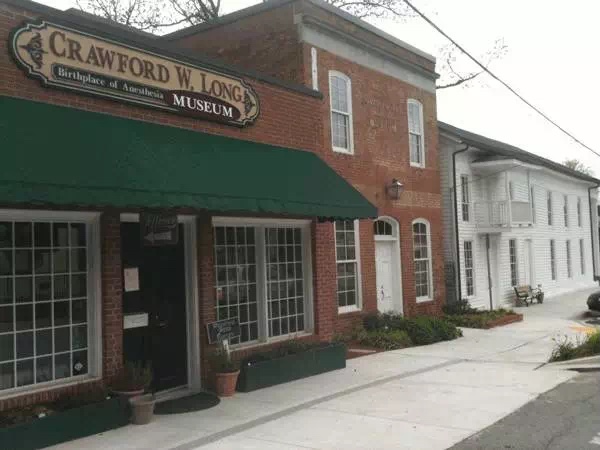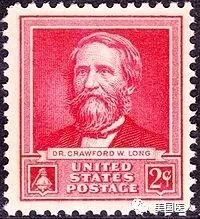北美华人医师联盟
北美华人医师联盟医务人员作品by 风城黑鹰
在新冠大流行一周年后的首个"美国国家医生节"之际, 向所有的医生们表示感谢, 致敬!
节日快乐!
自1991年老布什总统签署生效后,每年3月30日就成了美国国家医生节(National Doctor's Day)。这一节日起初是怎么来的呢?其实是与一位叫朗医生有关, 朗医生当时是美国外科医生及药物学家。
(Dr. Crawford Williamson Long , Dr. Long, November 1, 1815 – June 16, 1878)


话得说回到1842年3月30日,美国乔治亚州(Georgia)的一个叫杰弗逊(Jefferson)的地方,那天Dr. Long成功地为一位年轻患者摘除了颈部肿块,手术中成功实施了人类历史上第一例乙醚全麻。从前病人常常因手术中无镇痛而不敢做手术,医生也因为不能保持术中病人安静而影响手术效果。此后需要手术的病人告别了因为疼痛而导致的恐惧。

为了纪念这一麻醉手术的成功,查尔斯阿尔蒙得医生(Dr. Charles Almond )的妻子Eudora Brown Almond 在乔治亚州建议以3月30日作为庆祝日,于是,第一个医生节是1933年3月30日在当地名叫温德 (Winder, Georgia) 的地方首次庆祝的,当时庆祝的方式是给医生及医生家属送贺卡及鲜花,以后这种庆祝便在乔治亚州州延续使用下来。
在接下几年中,朗医生用麻醉又做了很多手术,包括一些产科手术。因为是临床医生,所以他没有把这些原创手术方法写成论文发表。
直到1848年,朗医生的工作才被人们报道。曾经一段时间里人们忘记了朗医生为人类所做的这一史无前例的贡献。
有趣的是,在1846年10月16日,莫顿医生(Morton) 在麻省总医院实施了一例乙醚麻醉手术, 这是世界首位在新闻媒体前公开施行乙 醚麻醉的另一位美国麻醉医生,人们误认为莫顿医生是乙醚麻醉首创者,人们在莫顿医生墓碑上写道:“在他以前,手术是一种极大的痛苦; 因为他,手术的疼痛被攻克;从他以后,科学战胜了疼痛”。 以致于在很多教科书里, 都是将莫顿医生作为现代麻醉学的开山鼻祖。
后来有人记起了真正第一位做麻醉手术的 Dr. Long。那还得追朔到1879年6月18日,当时美国国家全科医生协会( National Ecectic Medical Association) 正式宣布追认Dr. Long 为首位在人类手术中使用乙醚麻醉的人。
好在美国是一个尊重发明及专利的国家, 在确认 Dr. Long 的确是第一位乙醚麻醉的施行者后,人们终于给朗医生拨乱反正了。并为他发行了一枚纪念邮票, 随后世界各地都建有他的塑像,油画,纪念碑以示对先行着念的记念与崇敬。


后来就在上世纪90年代初某时,朗医生的家乡乔治亚州议员向国会提交了一项议案, 建议国家将他施行乙醚麻醉的这一天, 即3月30日定为美国国家医生节。
这一议案在国会参众两院通过后,由美国总统老布什于1991年签署了总统令(见英文附件)。从此, 每年3月30日这一天正式成为美国国家医生节( National Doctor’s Day)。
2021年的医生节,是新冠大流行一周年后的第一个,我们医院继续保留我们的传统, 在3月30日这天,为医生提供免费早餐及午餐以示祝贺。不同的是,今年不能聚在一起吃自助餐,只能每人拿走一袋包装好的餐包。

附:老布什总统签署关于医生节的文件。
|
|
A Proclamation More than the application of science and technology, medicine is a special calling, and those who have chosen this vocation in order to serve their fellowman understand the tremendous responsibility it entails. Referring to the work of physicians, Dr. Elmer Hess, a former president of the American Medical Association, once wrote: "There is no greater reward in our profession than the knowledge that God has entrusted us with the physical care of His people. The Almighty has reserved for Himself the power to create life, but He has assigned to a few of us the responsibility of keeping in good repair the bodies in which this life is sustained." Accordingly, reverence for human life and individual dignity is both the hallmark of a good physician and the key to truly beneficial advances in medicine. The day-to-day work of healing conducted by physicians throughout the United States has been shaped, in large part, by great pioneers in medical research. Many of those pioneers have been Americans. Indeed, today we gratefully remember physicians such as Dr. Daniel Hale Williams and Dr. Charles Drew, who not only advanced their respective fields but also brought great honor and pride to their fellow Black Americans. We pay tribute to doctors such as Albert Sabin and Jonas Salk, whose vaccines for poliomyelitis helped to overcome one of the world's most dread childhood diseases. We also recall the far-reaching humanitarian efforts of Americans such as Dr. Thomas Dooley, as well as the forward-looking labors of pioneers such as members of the National Institutes of Health, who are helping to lead the Nation's fight against AIDS, cancer, and other life-threatening diseases. These and other celebrated American physicians have enabled mankind to make significant strides in the ongoing struggle against disease. However, in addition to the doctors whose name we easily recognize, there are countless others who carry on the quite work of healing each day in communities throughout the United States -- indeed, throughout the world. Common to the experience of each of them, from the specialist in research to the general practitioner, are hard work, stress, and sacrifice. All those Americans who serve as licensed physicians have engaged in years of study and training, often at great financial cost. Most endure long and unpredictable hours, and many must cope with the conflicting demands of work and family life. As we recognize our Nation's physicians for their leadership in the prevention and treatment of illness and injury, it is fitting that we pay special tribute to those who serve as members of the Armed Forces and Reserves and are now deployed in support of Operation Desert Storm. Whether they carry the tools of healing into the heat of battle or stand duty at medical facilities in the Persian Gulf and elsewhere, these dedicated physicians -- along with thousands of nurses and other medical personnel -- are vital to the success of our mission. We salute them for their courage and sacrifice, and we pray for their safety. We also pray for all those who come in need of their care. In honor of America's physicians, the Congress, by Senate Joint Resolution 366 (Public Law 101-473), has designated March 30, 1991, as "National Doctors Day" and has authorized and requested the President to issue a proclamation in observance of this day. Now, Therefore, I, George Bush, President of the United States of America, do hereby proclaim March 30, 1991, as National Doctors Day. I encourage all Americans to observe this day with appropriate programs and activities. In Witness Whereof, I have hereunto set my hand this twenty-first day of February, in the year of our Lord nineteen hundred and ninety-one, and of the Independence of the United States of America the two hundred and fifteenth.
|




